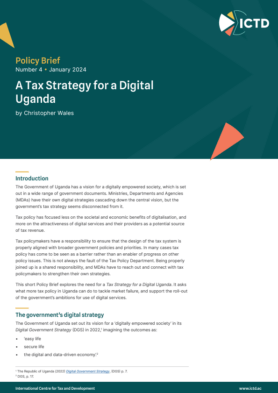Policy Brief 4
The Government of Uganda has a vision for a digitally empowered society, which is set out in a wide range of government documents. Ministries, Departments and Agencies (MDAs) have their own digital strategies cascading down the central vision, but the government’s tax strategy seems disconnected from it. Tax policy has focused less on the societal and economic benefits of digitalisation, and more on the attractiveness of digital services and their providers as a potential source of tax revenue. Tax policymakers have a responsibility to ensure that the design of the tax system is properly aligned with broader government policies and priorities. In many cases tax policy has come to be seen as a barrier rather than an enabler of progress on other policy issues. This is not always the fault of the Tax Policy Department. Being properly joined up is a shared responsibility, and MDAs have to reach out and connect with tax policymakers to strengthen their own strategies. This short Policy Brief explores the need for a Tax Strategy for a Digital Uganda. It asks what more tax policy in Uganda can do to tackle market failure, and support the roll-out of the government’s ambitions for use of digital services.
